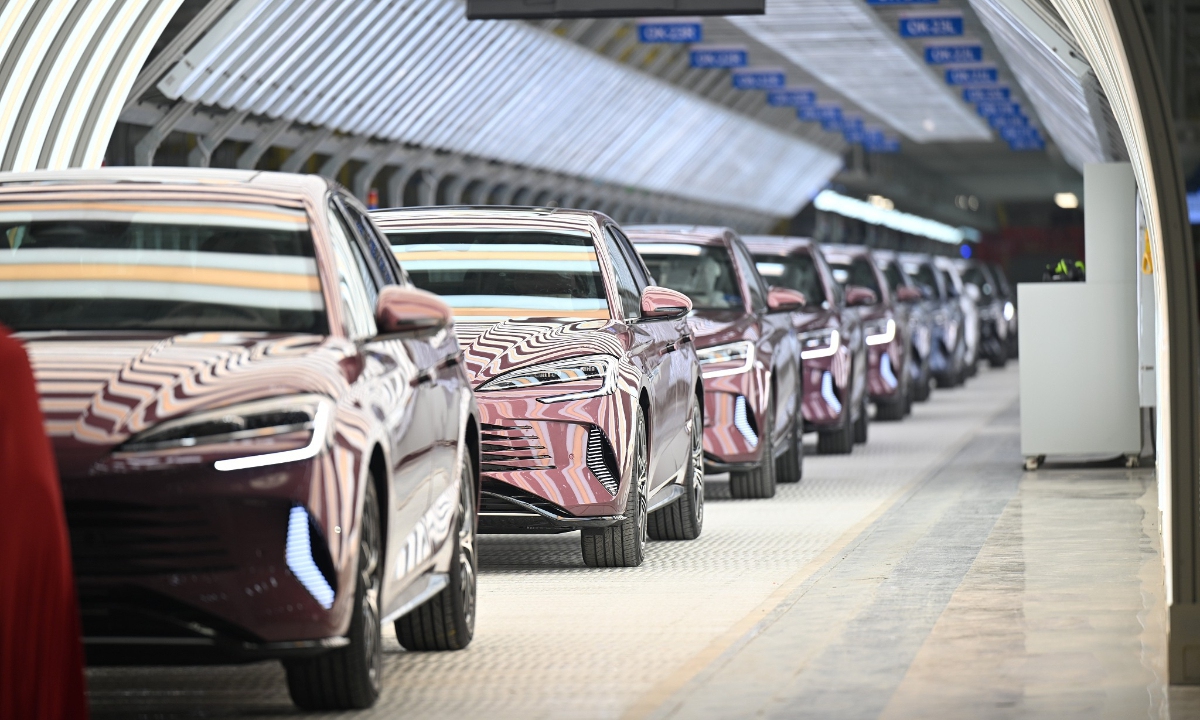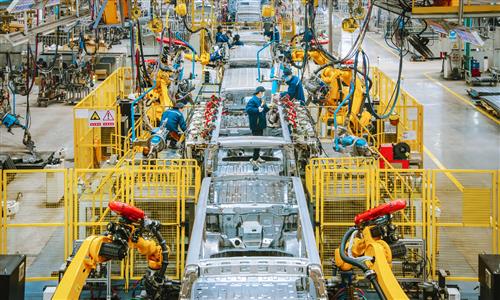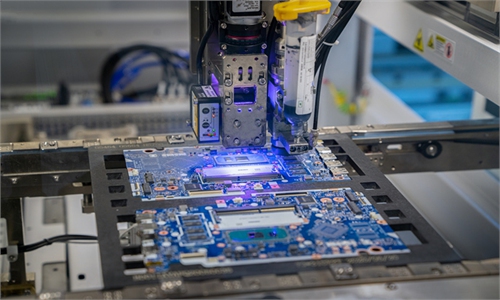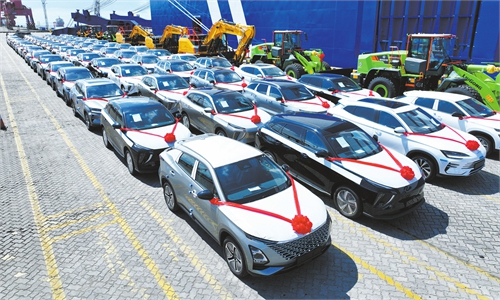
EV Photo:VCG
A comment by the EU trade chief on EU members' likely readiness to back tariffs on imports of Chinese electric vehicles (EVs) is a typical rhetorical tactic to ramp up pressure on EU members, and it's also an attempt by the European Commission (EC) to show a tough and consistent stance on the issue, observers said, amid ongoing negotiations between the Chinese and EU sides over the EV tariff dispute.
In July, the EU imposed provisional tariffs on EVs made in China in a range of 17.4 percent to 37.6 percent. EU members will likely vote on more permanent tariff proposals in late October, which will be applied in November.
The European official's comment, coming as individual EU member states ponder their votes on the final decision, has underscored the obstacles the EC faces in introducing additional tariffs on Chinese EVs, as member states have shown increasing divisions on the issue, and many industry groups have also lambasted the tariff hike and warned against the dire consequences of such protectionism.
Meanwhile, as a number of EU countries, despite the tariff spat, have publicly voiced welcoming attitudes to Chinese EV investment, more clues have surfaced in recent days about potential concessions the bloc could make to reach a consensus with China.
Industry insiders said that Brussels needs to find a "balanced approach," instead of resorting to coercion, in attracting Chinese automakers. The first step is to immediately scrap the politically motivated EV probe and show more openness in economic cooperation with China. If a permanent tariff was imposed, it could spark a brutal trade row that would inflict "irreparable damage" on China-Europe relations, they stressed.
EU member states are likely to support the imposition of proposed tariffs on Chinese EVs in November, said Valdis Dombrovskis, the European commissioner for trade, according to a Financial Times report on Monday.
Cui Hongjian, a professor at Beijing Foreign Studies University's Academy of Regional and Global Governance, told the Global Times on Tuesday that these words sent a variety of signals, one of which is that the EU commission is "having some difficulties in pressuring certain members to formulate a united supporting stance on Chinese EV tariffs."
The interests of some member countries, such as major auto producer Germany, and Hungary, which is a major recipient of Chinese investment including from BYD, apparently stand in contrast to EC tariff hikes. Such opposition has been building in recent months, observers pointed out.
While some other EU member states could push for EV tariffs, "Germany is quite skeptical about extra taxes on the import of e-vehicles from China. What we do not need is a trade war and excessive protectionism. A rule based on international order is the best option for all parties in this world," Jo Leinen, former chair of the European Parliament's Delegation for Relations with China, told the Global Times.
In a non-binding advisory poll in July regarding the tariffs, some EU members voted in support, four voted against and 11 abstained, according to a Reuters report, citing sources. It is believed that the large number of abstentions reflects wavering among many EU members.
In addition, leading European carmakers including BMW, Mercedes-Benz and Volkswagen have voiced support for fair competition and free world trade, according to media reports, with some warning that the negative effects of the tariff decision would outweigh any benefits for the European automotive industry.
According to Cui, the European Commission, after a new term starting in 2024, is also trying to maintain policy consistency in "de-risking" from China and taking a tough stance on Chinese issues. The ultimate aim is to rally more support from EU members in the name of "protecting European core interests," amid a complex European political environment.
"Among EU members, there should be a possibility for a compromise [for EV tariff negotiations]," Leinen suggested.
Leinen predicted that the EU, through negotiations, would like to get clarity about the claimed subsidies for the Chinese car industry and decide afterward whether tariffs should be raised or not. Another line of compromise, according to him, could be an agreement on the annual amount of imports for a certain period.
According to analysts, some EU countries could be leveraging tariffs as a bargaining chip in exchange for Chinese investment in EVs, a field where European firms are laggards.
Some EU countries including France and Spain, despite indications in early July that they would support tariffs, have been competing for Chinese investment in recent days. Cui said that the trend sheds light on the potential room for Brussels to make concessions during the negotiation process.
"But you can't have it both ways… For Brussels, cancelling the politically driven EV probe is the fundamental step and the only right way to attract Chinese investment," Cui noted.
"The final decision depends on the outcome of negotiations and other factors. But the EU must bear in mind that if a permanent tariff is eventually imposed, it could cast a shadow over the outlook for bilateral cooperation and even ignite a full-fledged trade row between the Chinese and European economies. It will also ruin the political trust built up over decades," Cui said.



